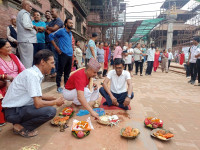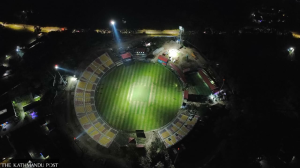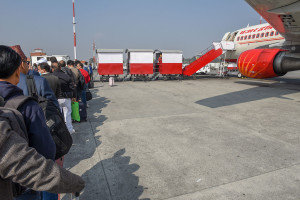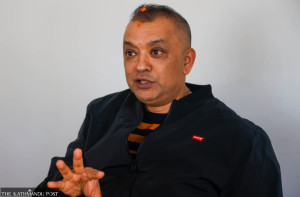Culture & Lifestyle
Singing the song of the soil
Author Chuden Kabimo makes a splash at India’s Jaipur Literature Festival with his book ‘Fatsung’.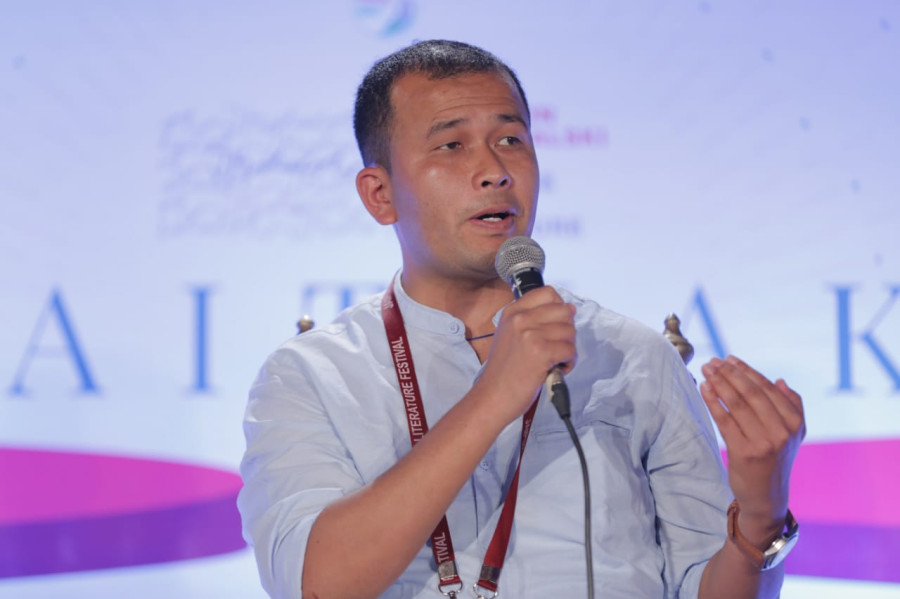
Mimamsha Dhungel
Having been the first Nepali language book read out aloud at the Jaipur Literature Festival (JLF), writer Chuden Kabimo’s debut novel, Fatsung: Song of the Soil, has created a history of sorts on the Nepali literary scene. The English version of Fatsung; Song of the Soil translated by Ajit Baral was even shortlisted for the JCB (Joseph Cyril Bamford) Prize for Literature.
“I did not take myself to the Jaipur Literature Festival, I took Nepali language and the love of my readers to that platform,” said Kabimo.
Jaipur Literature Festival is one of the largest literary fests in the world. Every year, authors and readers all around the world gather to have deep, insightful conversations about their books and the relevant contemporary issues. This year too, JLF had notable speakers like Shashi Tharoor, Gaur Gopal Das, Sudha Murthy, Javed Akhtar, Gulzar, Chitra Banerjee, Shehan Karunatilaka, and many more. Chuden Kabimo was a part of this humongous literary platform, representing the Nepali language and literature.
Kabimo is a writer based in Kalimpong, India. He traces his roots back to the remote village of Malbung, where he grew up. Growing up in a Nepali-speaking community, he credits his rural upbringing for his command of the Nepali language. Kabimo comes from a tribal community native to Darjeeling/ Sikkim called Lepcha. With a Lepcha father and a Chhetri mother, Kabimo is fond of his mixed heritage and culture.
He holds a Master's degree in political science and started writing short stories at a very young age. Even in school, Kabimo would scribble short stories and share them with his friends. His stories, full of anecdotes and local inspiration, touched many people. Encouraged by the feedback, he wrote his first book, 1986; a short stories anthology, consisting of 11 stories. This book was published in 2015. The titular prose 1986 was inspired by the Gorkhaland Movement that happened in 1986. Kabimo was awarded the Yuwa Sahitya Akademi Puraskar in 2018 by the Indian government for his book. This award acknowledges the best book published in a given language.
In 2019, Kabimo wrote his first novel, Fatsung, which was originally written in Nepali. The book was published by FinePrint Publications, Nepal. The book was first published in Nepal, a month prior to being published by Sambodhan Publication, based in Siliguri, India.
Kabimo recalls his initial days of drafting the novel. It had humble beginnings and Kabimo never expected the book to go beyond Darjeeling, let alone reach Nepal. He shared a memorable anecdote of naming the book. Kabimo was drinking tea with his friends and randomly came up with the word, Fatsung. Fatsung is a Lepcha word meaning stories or songs of the soil. The book tells the raw stories of people living in Darjeeling and the historical Gorkhaland movement. It brings the organic flavours of a Nepali-speaking community where references from his childhood and personal experiences paint majestic colours. When we read western books, there are so many references that we are not aware of. But, Fatsung feels at home. The quirky statements, slangs, and humorous connotations make it almost like an everyday conversation. The writer and the translator have done a brilliant job in maintaining the authenticity of Nepali spoken in Darjeeling where it remains the common language.
Kabimo talked about the process of writing the book. Like most of us, he too found the beginning of the story difficult to write. “It is always the start and the end that leaves me hanging. I wrote the middle part, which heavily focuses on the political history of the Gorkhaland Movement by talking to around 50 to 60 odd people. Based on discourses, conversations, and content analysis, the middle section was ready. It was a hefty task to embellish the book with a suitable beginning that would not bore the readers. I needed the book to connect with the reader,” he added.
Any writer takes inspiration from personal experiences while curating a book. Kabimo too needed many characters from his life to create the enigmatic characters of his book. For instance, he needed a particularly notorious character for his book. When he was in his village, he looked for the ‘badmash’ kids. It was only after his own brother said: “Who could be more badmash than me in this entire village?” that the character struck a chord. Kabimo hilariously narrated the fact that his character, Ripden, was inspired by his own brother.
A book belongs to an author only until the point he or she finishes it. Once the book gets published, it embarks on its own journey, according to Kabimo. He never anticipated that his book, Fatsung, would create its own path and reach Kathmandu. But the book indeed crossed the borders and arrived in the heart of the country and was published. Kabimo did not write for glory. He wanted people in his region to read and know about their history. He just wanted to tell the ballad of his soil. Yet language connected him to the larger Nepali-speaking diaspora.
When the book was published and read by readers in Nepal, it was initially a very unfamiliar name. Kabimo remembers readers exclaiming that his name was already pretty difficult to pronounce and how they did not expect the name of the book to have an even more difficult pronunciation. Regardless, the Nepali readers welcomed Kabimo and his story with open arms. Kabimo was overwhelmed by the response for Fatsung he got from the Nepalis.
Kabimo’s Fatsung was first translated into Bangla by Samik Chakrabarty. It was later translated into English by Ajit Baral and will soon also be published in Hindi. Namrata Chaturvedi is translating Fatsung to Hindi and the new version is expected to be out before February 25.
Kabimo is currently working on a new book, which, according to him, will tell the story of tea. “Most of us start our days with a cup of tea. But how does the day start for those who make the tea?” he said, adding that this is why he wants to write the story of the indigenous and Nepali workers at tea gardens of Darjeeling Dooars.
Kabimo’s book is an amalgam of social reality, political commentary, and history. You will find lyricism in his words and the songs of his soil almost feel like confessional poetry. Kabimo believes that good stories will continue to be told in different parts of the world.
“Good translation only happens when you delve deep into the soul of the story. You have to understand literature as if it were the blood running in your veins,” claimed the author. He underscored the need for good translators to take the Nepali literature to voracious readers across the globe.




 16.12°C Kathmandu
16.12°C Kathmandu

